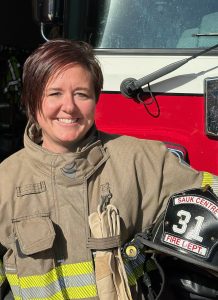Sauk Centre firefighter and EMT Andrea Kerfeld has been in the fire service for 15 years and is a recent addition to the MnFIRE Peer Support team. Andrea and her fellow peer supporters are a crucial support system for Minnesota’s 20,000 firefighters and their families. They provide free and confidential support to their colleagues experiencing personal, emotional or work-related problems.
Andrea shared about her time as a MnFIRE peer supporter and why she finds it incredibly rewarding to help her fire service brothers and sisters prioritize their mental health.
Tell us a little about yourself, your history with the fire service and who you are outside of your role as a firefighter?
 I am a lifelong Sauk Centre resident. I’ve been married to my husband Kelly for 23 years. We have three adult daughters, Greta (22), Ellen (20) and Ava (19). My hobbies include gardening, cheering on the Minnesota Twins, and drinking coffee/socializing with friends. My full-time career is a 911 Dispatcher for the Douglas County Sheriff’s Department in Alexandria, MN. I’ve been dispatching for eight years.
I am a lifelong Sauk Centre resident. I’ve been married to my husband Kelly for 23 years. We have three adult daughters, Greta (22), Ellen (20) and Ava (19). My hobbies include gardening, cheering on the Minnesota Twins, and drinking coffee/socializing with friends. My full-time career is a 911 Dispatcher for the Douglas County Sheriff’s Department in Alexandria, MN. I’ve been dispatching for eight years.
My journey in the fire service began a little differently than most, I would guess. As a staff writer for the local newspaper at the time, I thought it would be fun to do a ride-along with the fire department to write a more interesting story for our October Fire Prevention special edition. For approximately six months, I was given a pager and allowed to observe call responses, as well as the department’s meetings and drills. I was hooked! The experience very much reminded me of my time in the Minnesota Army National Guard, as I’d recently completed my eight-year enlistment in the military. I joined the department in March of 2010, becoming the first woman firefighter in Sauk Centre history.
Why did you become a MnFIRE peer supporter?
I am also a member of the Douglas County Sheriff’s Office peer support team. Our clinician who leads our team for the County told me about MnFIRE and their peer support program. I very much enjoy my role in peer support and understood the need for more resources in the fire service. I became a peer supporter to help bring awareness to my fellow firefighters of the importance of taking care of their mental health and to help normalize conversations about mental health.
What have you found to be rewarding about your role as a peer supporter?
Learning that we all struggle. While all struggles may not be the same, many of our fears, anxieties and stressors are. I think people often feel they are the only ones experiencing something, so they keep it to themselves out of fear of being judged. When in reality, we all have more in common than not.
What is the most surprising part of being a peer supporter?
While a traumatic call or event may be the trigger or tipping point, it’s hardly the sole reason we may need to reach out for some extra support. Regardless of what we face on the fire/rescue scene, life still goes on! Marriages and relationships still need attention, kids need to be cared for, finances need to be managed, etc. I find it’s usually a combination of stressors that overwhelm a person.
For others who may want to join MnFIRE’s Peer Support program, what qualities make a good peer supporter?
I believe trust is the biggest and most important quality. If people can’t trust you to keep their conversations private, you won’t succeed. The other thing is just being a good listener. You don’t have to have all the answers or the right words. You just need to be able to listen with a compassionate heart and understanding ear.
What practices do you engage in to keep yourself mentally healthy?
I am a big believer in the “you can’t pour from an empty cup” philosophy. I try to be very conscious of my time and where it’s spent and in maintaining a healthy work/life/home balance. Saying “no” is an art I’ve only recently begun to master! Time alone, in complete silence, is a must for me. My faith is also central to my well-being. Spending time in prayer or listening to worship music is my medicine.
What do you believe is the number one thing your fellow firefighters should do to improve their mental health?
Recognize your need to address and maintain it. If you have a brain, you must be mindful of your mental health. Just like you exercise or tend to any other part of your body, realize your brain needs care and attention as well. And it’s not a contest to see who can handle the most! Especially in a male dominated industry, guys like to shoulder more than their fair share. But we can only hold so much. Having a confidential conversation with a member of the Peer Support team may be all you need to get things out in the open, process them and feel better.
What do you see as the most valuable component of the Hometown Heroes Assistance Program (HHAP)?
The awareness it brings to issues. We can’t correct problems unless we know about them.
Anything else you’d like to add?
As firefighters, we wouldn’t hesitate to help someone in physical danger. It’s what we do! But don’t hesitate to help someone who’s struggling mentally, either. If you see someone acting out of character, making off comments, or withdrawing, reach out. A simple text can go a long way in helping someone realize they are not alone.
Help is just a call away
MnFIRE Peer Support is a safe, confidential space to talk about what you’re going through with someone who gets it. Minnesota firefighters and their family members can get connected with a peer supporter by calling our 24-hour helpline at 888-784-6634, and selecting option 2.

